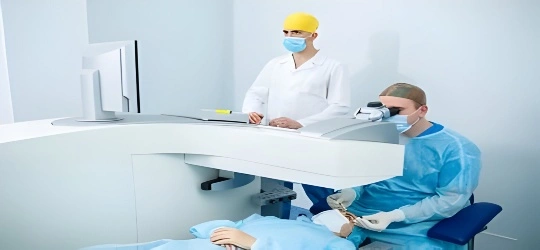Glaucoma is a progressive eye disease that can lead to vision impairment and blindness by damaging the optic nerve at the back of the eye. Without treatment, glaucoma can result in permanent vision loss or complete blindness. Although it is impossible to regain lost vision, treatments can help slow the progression of damage done in the primary phase of the disease.
Treatment options for glaucoma include eye drops, laser therapy, and surgery. Patients who need more than one medication or who are in severe pain due to high eye pressure or as an adjunct to eyedrops, laser treatment for glaucoma can be especially beneficial. Their advantages are detailed in this blog, corresponding to various treatment plans for distinct scenarios.
How Laser Eye Treatment Works?
Using a programmed laser, your eye surgeon treats either the trabecular meshwork or iris to establish communication between anterior and posterior chambers of the eye thereby reducing pressure in the eye which otherwise hurts the optic nerve.There are various types of laser treatment for glaucoma are available:
1. Laser Trabeculoplasty (SLT)
Suitable for:
- Open-angle glaucoma: The predominant type characterized by a blocked but still open drainage system.
- Glaucoma with protein buildup (sometimes): If the protein buildup isn’t severe and doesn’t block drainage too much.
Procedural Steps:
- A numbing eye drop is applied.
- A specialized contact lens is applied to the eye to concentrate the laser beam.
- Short laser pulses are delivered to specific areas of the tissue network responsible for fluid drainage.
- These laser pulses might help the drainage system work better by stimulating repairs within the tissue.
2. Laser Peripheral Iridotomy (LPI)
Suitable for:
Angle-closure glaucoma: Creates a new drainage pathway if the natural opening is narrow or almost closed. In eyes which have a closed angle but normal eye pressure and no optic nerve damage, laser iridotomy may be recommended as a preventive treatment. In a recent large prospective study of such eyes, it was shown that there was overall a low risk of developing high eye pressure but the risk was lower among eyes that received laser iridotomy compared to those that did not.
You may see flashes of bright green or red light during the treatment. Most people feel little or no pain or discomfort during the treatment.
If you have glaucoma in both eyes, your doctor may treat both eyes on the same day — or they may treat 1 eye and schedule treatment for your other eye a few days or a few weeks later.
Are there any side effects?
Laser treatment can cause side effects, just like any procedure. You may have some swelling or soreness. Sometimes the laser can scratch the cornea (the clear front layer of the eye) or make the cornea very dry. This can be painful, but the pain usually goes away quickly as the cornea heals. Your doctor can give you eye drops to help.
How long does it take to recover?
Most people can go back to their normal daily activities the day after their laser treatment.
Right after the treatment, your eye may be irritated and your vision might be blurry, so you’ll need someone to give you a ride home from the doctor’s office.
Will I need more treatment?
Laser treatment works very well for most people, but it doesn’t work for everyone. You’ll need to wait 4 to 6 weeks to find out if the treatment worked. Most people will need to keep taking glaucoma medicines even after laser treatment. You’ll also need a few follow-up visits so your doctor can check your eye pressure.
Because the treatment wears off over time, some people may need to get laser treatment more than once. Your doctor may also suggest other treatment, like glaucoma surgery.
Laser treatment for glaucoma can lower eye pressure, improve drainage, and prevent blockages, which, if untreated, can result in permanent vision loss. Temporary side effects like inflammation, discomfort, or blurred vision typically subside quickly. Following aftercare instructions, including follow-ups and eye drops, is highly recommended. The effectiveness of this laser treatment varies with the type and severity of glaucoma. For personalized treatment, consult a qualified ophthalmologist at Shri Venkatesh Eye Institute for the most effective care to manage your glaucoma and protect your vision.

